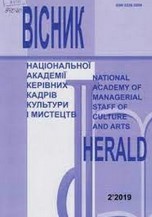ЗАХІДНОЄВРОПЕЙСЬКИЙ МУЗИЧНО-ВИКОНАВСЬКИЙ ПРОФЕСІОНАЛІЗМ В ІСТОРИКО-ЕВОЛЮЦІЙНОМУ ТА СУСПІЛЬНО-КУЛЬТУРНОМУ КОНТЕКСТАХ
WESTERN EUROPEAN MUSICAL AND PERFORMANCE PROFESSIONALISM IN HISTORICAL-EVOLUTIONARY AND SOCIAL-CULTURAL CONTEXTS
Author(s): Ostap MaychykSubject(s): Music, Middle Ages, Modern Age, Vocational Education, Sociology of Art, History of Art
Published by: Національна академія керівних кадрів культури і мистецтв
Keywords: musical professionalism; performance practice; public concerts; vocational education; forms of artistic life; evolution;
Summary/Abstract: The purpose of the article is to reveal the regularities of the polymorphism of the Western European music performance paradigms of professionalism in historical and socio-cultural coordinates from the Middle Ages to the end of the 19th century. The research methodology: source studies for the formation of ideas about the scientific and applied practical basis of performance principles and educational systems of different eras laid out in treatises, methods, instrumental schools of European thinkers, teachers, and performers-practitioners of the past; retrospective and system-analytical in the selection and analysis of scientific literature; cultural-historical to trace the historical dynamics of musical and performing expertise in the lens of the aesthetic and spiritual superstructure of society. The scientific novelty lies in the fact that the consideration of the problem of epochal changes in performing traditions is carried out contextually. Taking as a basis the definition of the musical professionalism of the performers, their activity as the main profession, provided with relevant skills and knowledge, which is the basis for obtaining a means of livelihood (not a related occupation, a form of leisure, or hobby), the musical and performing forms characteristic of certain historical eras and are relevant to public demands and requirements for specialists in various performing industries. In parallel, methods and means of understanding musical professionalism are considered. Conclusions. The detection of regularities in the evolution of the criteria of performers’ musical professionalism in the historical and sociocultural projection demonstrates a gradual shift from church and court performance to secular (concert and every day) performance. This dictates the polymorphism and adaptability of the category of musical and performing professionalism. At the same time, there were processes of deeper differentiation of individual specialties, improvement of tools, development of a system of special education centres, development of music science from philosophical generalisation to the study of specific practical-executive and special-pedagogical issues. The named objective manifestations of evolution were accompanied by an increased concentration of attention on the personal and individual growth of the performer and their spiritual and intellectual development.
Journal: Вісник Національної академії керівних кадрів культури і мистецтв
- Issue Year: 2022
- Issue No: 4
- Page Range: 96-101
- Page Count: 6
- Language: Ukrainian

